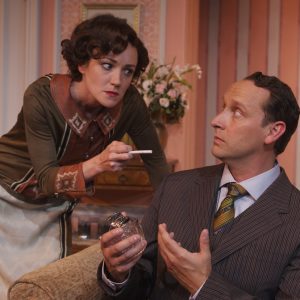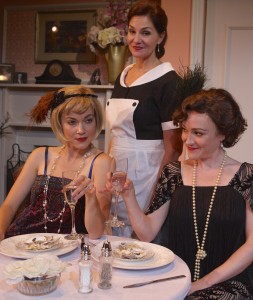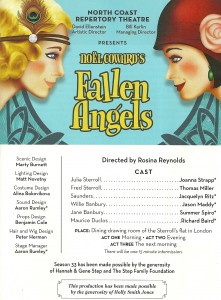‘Fallen Angels’ Ignores the Important Stuff
Anybody here ever have the dubious privilege of watching two women in a barfight over a man? It helps if both parties are three sheets and they’ve known each other all their lives – in any case, neither girl gives the slightest quarter, and woe betide anybody who tries to break ’em up (ask me how I know). World War II looks like a playground spat by comparison as hair flies and lips and eyes balloon and blood gushes and threads of undergarment (and, in my case, a fingertip) mark Ground Zero for succeeding generations.
Maybe Noël Coward once saw such a flap and decided to adapt it into Fallen Angels, North Coast Repertory Theatre’s season opener and a middling look at Coward’s expertise in the fine art of sex farce. You’ve seen these characters, or people like them, a gadrillion times in everything from the Marx Brothers movies to the soaps – two bored housewives; their insufferably button-down husbands; the mysterious stranger who’s boinked both girls; and the smart-ass maid (portrayed very well here) who’s forgotten more about the world than the wives will ever have the sense to learn.

Julia Sterroll (Joanna Strapp) clearly wears the pants in husband Fred’s (Thomas Miller) family. Photos by Aaron Rumley.
It’s not the characters’ familiarity that bothers me, as Coward writes their dialogue with cadence and purpose. But he’s nearly neutered their effectiveness amid his virtual absence of understory, thus our disinterest. The principals do booze their way through a lot of the play, and that’s how come I draw the barfight analogy – but if a barfight is a legitimate parallel, this Fallen Angels seems to have been staged after hours.
In the history of the universe, no pod has ever birthed two peas the likes of Julia Sterroll and Jane Banbury. Friends since their teens, the Londoners long ago established their assignments within their relationship; Julia is alpha-female, patiently enduring Jane’s tantrums without jeopardizing her place in the pecking order, while Jane’s subordinacy is colored by her indelible simper and vacuous giggle. On this day, the two have a lot of catching up to do. Frenchman Maurice Duclos, who’d done the dirty with both women before they’d met their husbands, has come to call, and amid their dull unions to two cardboard cutouts out for yet another day of golf, the girls’ only natural response is to slosh themselves silly as they reminisce.
Crazy little Jane makes the pivotal observation that drives (or should drive) the story, to wit: Even as men spend way too much time and energy feeling their oats, it’s the women’s job to make them think their antics are somehow justified. That would explain their dalliances with Maurice during their singlehood – but marriage changes absolutely everything about a body, and in this instance, we’re simply not privy as to how. Coward writes husbands Fred Sterroll and Willie Banbury as window dressing, alluding to little more than their golf games and their general neediness in explaining the core histories that led them to their wives. Yes, the girls are bored in their marriages – but for us, that’s founded on hearsay, and that just isn’t enough to hold our attention.

Jane Banbury (Summer Spiro, left) and Julia Sterroll (Joanna Strapp, right) hold a vigil for friend Maurice as pepperpot Saunders (Jacquelyn Ritz) smirks on.
Director Rosina Reynolds has cast Julia and Jane well to type – Joanna Strapp’s severe features contrast nicely with Summer Spiro’s girlishness, and the actors build a decent chemistry from there. Jacquelyn Ritz’s maid Saunders is confident and quick with a quip, and Richard Baird’s Maurice exploits a glad-handing savoir-faire. Beyond that, there’s nothing to explain everybody’s interconnection amid Thomas Miller’s and Jason Maddy’s threadbare assignments as the hubs. Ritz is quite underused as the aboveboard Saunders; her character’s carriage and composure hint that she’ll eventually spill some wisdom to tie up the marriages’ loose ends, but Coward doesn’t fill her out. The tech effort is well considered, down to the little bell Julia uses to summon Saunders, but it loses much amid such short editorial shrift.
It says here that this show premiered in 1925, and I’ll presume that that was at a London venue. Audiences were reportedly shocked by the sex-oriented themes and insinuations, but even in this so-called enlightened era, the play’s lightweight development makes that hard to imagine. This Fallen Angels goes down way too easy – can’t say the same for the blood-laden bravado that marked the real drama on a booze-soaked dance floor a generation prior and half a world away.
This review is based on the matinee performance of Sept. 7. Fallen Angels runs through Sept. 28 at North Coast Repertory Theatre, 987-D Lomas Santa Fe Drive in Solana Beach. $41-$48. 858-481-1055, northcoastrep.org.



